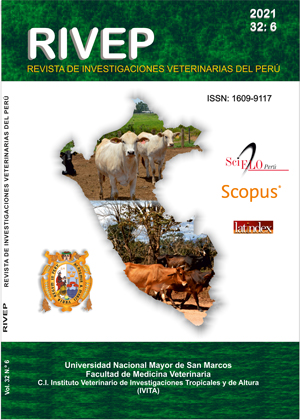Effect of energy-protein supplementation on productive performance of Romosinuano cows during pre and postpartum
DOI:
https://doi.org/10.15381/rivep.v32i6.20125Keywords:
Romosinuano, nutrition, metabolic profile, prepartum, postpartumAbstract
The effect of energy and protein densities of diets on homeostasis, metabolic profile and productive performance during pre and postpartum periods of Romosinuano cows was evaluated. Thirty grazing cows were assigned to three nutritional supplementation groups: TC: 0.0, T1: 2.35 and T2: 2.8 kg/animal/day of energy-protein supplement. The experiment ran from 30 days before calving to 60 days postpartum. Body weight (BW), body condition (BCS) and serum concentrations of glucose, cholesterol, total protein, β-hydroxybutyrate, non-esterified fatty acids (NEFAs), urea, aspartate aminotransferase (AST) and alanine aminotransferase (ALT) were evaluated. The prepartum supplementation did not affect BW (p=0.4557) nor BCS (p=0.1893). In the postpartum period, there was a significant effect of supplementation on BW (p=0.0343) and BCS (p=0.029) in T1 and T2 and on glucose at prepartum in T2 (p=0.0019). For cholesterol, there was a significant effect on prepartum in T2 (p=0.0036), as well as on days 5 and 60 postpartum in T1 and T2 (p=0.001). In β-hydroxybutyrate there was a significant effect on postpartum days 5 and 12 in TC (p=0.0365). For NEFAs there were no differences between treatments in the two phases. For total protein, a significant effect was found in the postpartum in T2 (p=0.0163) while for urea it was in the prepartum in TC (p=0.0334). For AST there was a significant effect on postpartum day 5 in T2 (p=0.0202) and for ALT at postpartum day 60 in T2 (p=0.0018). The supply of up to 2.8 kg/animal/day of energy-protein supplement optimizes the metabolic state of Romosinuano cows during the pre and postpartum period, and the productive performance, BW and BCS postpartum.
Downloads
Downloads
Published
Issue
Section
License
Copyright (c) 2021 Lorena-Inés Mestra Vargas, Rómulo Campos Gaona, Natalia Herrera Perez, Juan Carlos Fernández Niño, Katherine García Alegría

This work is licensed under a Creative Commons Attribution 4.0 International License.
AUTHORS RETAIN THEIR RIGHTS:
a. Authors retain their trade mark rights and patent, and also on any process or procedure described in the article.
b. Authors retain their right to share, copy, distribute, perform and publicly communicate their article (eg, to place their article in an institutional repository or publish it in a book), with an acknowledgment of its initial publication in the Revista de Investigaciones Veterinarias del Perú (RIVEP).
c. Authors retain theirs right to make a subsequent publication of their work, to use the article or any part thereof (eg a compilation of his papers, lecture notes, thesis, or a book), always indicating the source of publication (the originator of the work, journal, volume, number and date).










